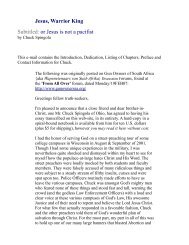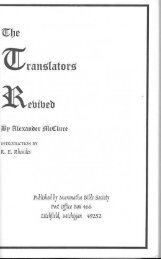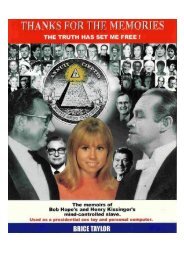THE PINK SWASTIKA - Shattering Denial
THE PINK SWASTIKA - Shattering Denial
THE PINK SWASTIKA - Shattering Denial
Create successful ePaper yourself
Turn your PDF publications into a flip-book with our unique Google optimized e-Paper software.
advancing a theory that defined homosexuals as a third sex. He proposed that male homosexuality<br />
could be attributed to a psycho-spiritual mix-up in which a man’s body came to be inhabited by a<br />
woman’s soul (and vice-versa for females). He called members of this third sex “Urnings” (male) and<br />
“Dailings” (female). Since homosexuality was an inborn condition, he reasoned, it should not be<br />
criminalized.<br />
Although Ulrichs was to be unsuccessful in changing the laws against homosexuality, his efforts did<br />
encourage widespread political activism. One early follower, a German-Hungarian writer named<br />
Benkert (under the pseudonym, Karoly Maria Kertbeny), coined the term “homosexual” in an<br />
anonymous open letter to the Prussian Minister of Justice in 1869 (Lauritsen and Thorstad:6). Steakley<br />
writes that prior to this, homosexuals were known as sodomites, pederasts, or<br />
“‘Knabenschaender’ (literally, ‘boy-ravishers’)” (Steakley:13). The first psychiatric study of<br />
homosexuality in Germany was published in 1869 as the result of Ulrichs’ efforts. It advocated the<br />
decriminalization of homosexuality in favor of medical treatment (Oosterhuis and Kennedy:13).<br />
Ulrichs’ greatest intellectual impact on his own generation came from his invention of the term<br />
“Uranians,” which he introduced in 1862 as a new designation for homosexuals (both Urnings and<br />
Dailings). He took the term from Plato’s Symposium, in which homosexual activity was said to fall<br />
under the protection of the ninth muse, Urania. In the late 1800s German homosexuals frequently<br />
called themselves Uranians, and a militant homosexual slogan, “Uranians of the world, unite!” became<br />
popular internationally (Rutledge:41). In the following quote Ulrichs uses the term in his explanation<br />
of the “third sex” theory, and graphically illustrates the mentality of the “Fems”:<br />
Apart from the womanly direction of our sexual desire, we Uranians bear another womanly element<br />
within us which, it appears to me, offers proof positive that nature developed the male germ within us<br />
physically but the female spiritually. We bear this other womanly element from our earliest childhood<br />
on. Our character, the way we feel, our entire temperament is not manly, it is decidedly womanly. This<br />
inner womanly element is outwardly recognizable by our outwardly apparent womanly nature (Fee:37).<br />
Ulrichs was publicly opposed to sadomasochism and pedophilia (perhaps because of his own<br />
molestation as an adolescent). He wrote against the concept of “Greek love” and considered “sexual<br />
attraction to the prepubertal to be a sickness.” In his attempts to repeal Paragraph 175 of the German<br />
Penal Code, Ulrichs advocated more stringent laws against pedophilia. Ulrichs’ condemnation of man/<br />
boy sex, however, extended only to prepubescent boys. As the following quote from his publication<br />
Forschungen Ueber das Raetsel der mannmannlichen Liebe (“Investigation of the Enigma of<br />
Homosexual Love”) reveals, Ulrichs was not opposed to sex between men and boys who were<br />
“sexually mature.”<br />
The Urning is not by a hair’s breadth any more dangerous to immature boys than the genuine man is to<br />
immature girls. For the rest, I gladly leave the child molester to his deserved punishment by the law.<br />
Let the integrity of a will-less minor be sacred to every Urning. I have no defense for whoever touches<br />
it. Therefore, let the seduction of immature boys, I grant it completely, be a punishable indecent act<br />
(Ulrichs:16).<br />
This distinction between mature and immature boys was lost on many who followed the rise of the<br />
homosexual movement in Germany. For example, Friedrich Engels, in a letter to Karl Marx about a<br />
book Ulrichs had written, said, “The pederasts start counting their numbers and discover they are a<br />
powerful group in our state. The only thing missing is an organization, but it seems to exist already,<br />
though it is hidden” (Plant:38). Engels considers Ulrichs a pederast despite his arbitrary age restriction<br />
for sex with boys.<br />
Ulrichs’ political activities paved the way for a large and powerful homosexual movement which<br />
grew both in numbers and in political and social influence in pre-Nazi Germany. Barely a quarter of a<br />
century after his death in 1895, homosexuality would become openly widespread in the Germany of the









